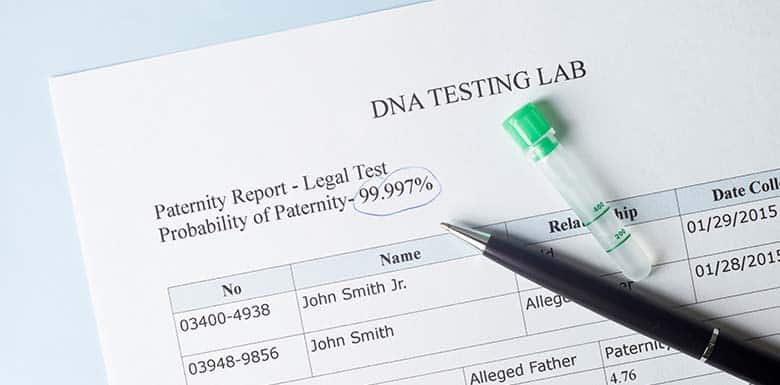
Written by Jonathan Breeden
You don’t need to be married to have children. However, practical legal matters relating to child custody and child support are more complicated for unmarried parents.
When it comes time to make formal agreements, enforce visitation rights, and officially define a relationship, both parents have a stake in proving or disproving a biological parentage.
Here are some ways paternity test results affect parental rights in North Carolina.
Paternity means fatherhood. Establishing paternity has significant legal and financial implications for children born out of wedlock.
Under North Carolina law, unmarried mothers automatically have sole custody of their children unless there are reasons to deem them unfit.
Fathers with an unknown or undocumented biological relationship have no right to seek custody or visitation with a child.
A man cannot assume legal custody (making decisions for a child’s health, education, and well-being) unless and until establishing paternity.
An unmarried mother cannot seek paternal child support payments without proof of paternity.
North Carolina does not automatically grant or enforce parental rights for children born outside of wedlock. Establishing paternity allows fathers to take an active role in their children’s lives, from residency issues to passing down assets by inheritance. They have a voice in their child’s schooling, medical care, religious education, and other vital matters.
By establishing paternity, neither the court nor the mother can deny a biological father from exercising his paternal rights unless other factors like drug abuse or violence exist.
Fathers who establish or acknowledge paternity can petition for shared parenting time and visitation. Both parents should develop a reasonable co-parenting plan to present to the court for approval.
If mom and dad cannot reach an agreement, the judge will create a custody arrangement.
Once a man establishes paternity, he may ask the court for co-legal custody. This status allows him to share in making decisions about his child, including education, religion, and extracurricular activities.
The court may allow newly established fathers supervised visitation. The court can request parenting classes, drug treatment programs, proof of employment and financial stability, and other stipulations before granting full custody or visitation.
The mother can request that a minor child’s biological father pay child support until 18. She may seek retroactive payments, although the court might not rule in her favor. Failure to pay court-ordered child custody might result in wage garnishment, tax refund seizure, or jail time.
Biological fathers who previously refused to pay because of unclear or unknown parentage must financially support their child. However, if a paternity test reveals that a man is not the biological father, he has no legal obligation to pay child support.
Children generally benefit from a relationship with both parents. According to the North Carolina Department of Health and Human Services, kids who know their biological father have a greater sense of identity and belonging.
There are also legal and financial benefits from establishing paternity, including:
Listing a father on a child’s birth certificate is not enough. People make mistakes, or they have other reasons.
An individual may establish paternity in North Carolina in several ways.
Being married before a child’s birth automatically establishes paternity. Getting married after a child is born also legitimizes the father’s paternity.
Unmarried parents can sign an Affidavit of Parentage. This legal document acknowledges and affirms that both parties are the child’s biological parents. An Affidavit of Parentage gives them legal rights and responsibilities under North Carolina law.
There are situations in which a mother demands that an alleged father prove his biological relationship. Other times, a man denied parental rights might opt for a genetic test to be included in his child’s life. A judge may also request a paternity test to approve or deny child custody, child support, or visitation.
Genetic testing compares tissue or blood samples from father and child to determine a DNA match. Usually, a paternity test uses a swab from inside each person’s cheek. These tests are highly accurate in determining paternity.
Establishing paternity is the first step toward creating a parent-child bond. To learn more about confirming paternity to resolve child custody, visitation, or support issues in North Carolina, contact the Breeden Law Office.
Call (919) 661-4970 to schedule a consultation.